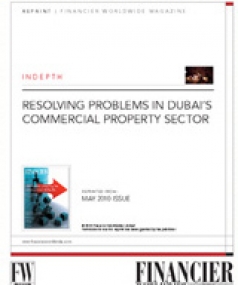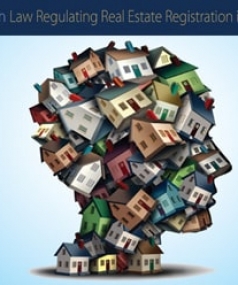Due Diligence in Property Purchase in Dubai: Legal and Commercial Safeguards for Freehold Buyers
Acquiring freehold property in Dubai - whether through off-plan investment or a secondary market purchase, demands rigorous and multidimensional due diligence. As real estate transactions in the Emirate grow in complexity and value, buyers must navigate legal, financial, structural, and zoning considerations with precision. In light of the Emirate’s evolving regulatory landscape, including Law Number 13 of 2008 regulating the Interim Real Estate Register in Dubai, and focusing on off-plan property sales, and further supported by 2025’s digital compliance systems, the due diligence process has become more vital and more sophisticated than ever.
This article provides a strategic, end-to-end diligence framework focused on villas and apartments, with streamlined guidance on land parcels, to ensure alignment with the Emirate’s evolving regulatory environment and safeguard long-term investment value.
Scope of Freehold Ownership
The freehold ownership regime, initially established under Law Number 7 of 2006 conferred perpetual title upon foreign nationals in designated areas of the Emirate. This legislation enabled foreign acquisition of ownership rights in various real estate classes, including, but not limited to villas, buildings (comprising apartments, and branded residential complexes), and undeveloped plots.
Villas offer the most expansive rights, including title to both the built structure and the underlying land, alongside private amenities such as gardens and pools - subject to the Dubai Land Department (DLD) approval for modifications under Decree Number 22 of 2023. This arrangement affords greater autonomy compared to apartments, which are governed under Dubai Law Number 27 of 2007 concerning Jointly Owned Property (JOP). Purchasers of apartments acquire title to interior units and a proportional share/interest in shared common areas (e.g., corridors, pools, parking facilities), which are administered by an Owners’ Association regulated by the Real Estate Regulatory Agency (RERA). The latter framework carries specific implications for service charges (fees) and permissible alterations.
Acquisition of land parcels, while less common among individual end-users, confers full plot ownership. However, any construction or development activity on such parcels necessitates specific approvals, primarily governed by Dubai Local Order Number 3 of 2007 (as amended) concerning planning and building regulations. Zoning classifications must be verified via the Dubai REST platform, and the Title Deed must be independently validated through DLD records to avoid reliance on potentially inaccurate developer disclosures. This stringent verification process is crucial to mitigate risks associated with relying solely on developer representations, which may subsequently prove to be incomplete or materially inaccurate.
Legal and Documentary Due Diligence for Property Acquisition in Dubai
Robust legal due diligence is paramount for any property acquisition in Dubai. This process begins with a meticulous verification of title and encumbrances, then extends to a detailed review of contractual provisions and a critical assessment of various transactional risks.
- Foundational Due Diligence: Title, Encumbrances, and Contract Review
The starting point of any due diligence is a detailed review of the Title Deed. This should ideally be conducted by a qualified legal professional to confirm the absence of any registered mortgages, liens, or other claims that could adversely affect the property’s title. A key tool in this process is the Property Status Report, which provides authoritative information on the property’s legal standing and any recorded liabilities.
The Sale and Purchase Agreement (SPA), as the governing instrument, requires careful legal scrutiny. Its provisions must align with Federal Law Number 5 of 1985 (the UAE Civil Transactions Law), with particular attention to Article 1432, which regulates sale contracts for specific property and related delivery obligations. For completed properties, the SPA must be registered with Ejari to ensure enforceability and formal recognition by the authorities. It should clearly define the payment schedule, handover timeline, and comprehensive default provisions, including the remedies available to each party in the event of non-performance.
For off-plan transactions, due diligence must account for the heightened regulatory framework under Dubai Law Number 13 of 2008 and Regulation Number 8 of 2021 (Governing Escrow Accounts for Real Estate Development). Developers must maintain RERA registration, an active escrow account, and demonstrable milestone compliance. Purchasers should verify these elements via the Oqood platform, which enables real-time tracking of project progress and escrow fund utilization.
Prior to transfer, the buyer must obtain a No Objection Certificate (NOC) under Executive Council Resolution Number 30 of 2023, confirming there are no outstanding dues or disputes with the developer or the relevant Owners’ Association. Buyers must also obtain full clearance from utility providers such as the Dubai Electricity and Water Authority (DEWA) and Empower (for district cooling) to avoid inheriting any outstanding liabilities. Signed and stamped receipts from the developer should be obtained for every payment made under the SPA to safeguard against disputes and ensure a complete audit trail.
- Advanced Considerations and Key Contractual Protections
Beyond preliminary checks, discerning investors must address a range of advanced legal and commercial issues to ensure the transaction is both secure and aligned with their investment objectives.
- Classification of Property and VAT Implications
Proper classification of the asset is crucial, as it determines the Value Added Tax (VAT) treatment. While the sale of bare land and the first supply of new residential properties (within three years of completion) are typically zero-rated, commercial properties are subject to 5% VAT. A property marketed as a “branded residence” may be classified as commercial for VAT purposes depending on its intended use, such as hotel-serviced apartments or short-term rentals triggering VAT on the purchase price.
In addition to acquisition tax, ongoing operational charges in such units may also attract VAT. These include service charges, maintenance fees, utility mark-ups, and hotel-related levies, particularly in fully serviced developments. Moreover, any future resale of a unit classified as commercial will likely fall within the scope of VAT, with the seller potentially liable to register and account for VAT if thresholds are met. Investors should obtain early confirmation of VAT classification to avoid unanticipated liabilities
- Developer Covenants, Obligations, and Remedies for Breach
The enforceability of a developer’s contractual obligations is critical. Beyond delivery timelines, the SPA should specifically address the following:
-
Change in Development Nature: The SPA must contain clear provisions regulating the developer’s ability to alter the nature of the development (e.g., converting branded residences into standard units). Absent defined consent mechanisms and remedies, such changes may amount to material breach, entitling the buyer to compensation, contractual termination, or specific performance under Federal Law Number 5 of 1985.
-
Failure to Handover Common Facilities: Completion of communal amenities such as pools, gyms, and landscaping is central to the value proposition. The SPA should fix clear deadlines for their delivery and outline consequences of non-performance, including the right to claim compensation or other remedies under applicable real estate regulations.
- Contractual Enforcement and Recourse: Investors should assess whether the SPA entitles them to compensation or interest in the event of default or termination. In practice, many SPAs heavily favor developers and may exclude any obligation to pay interest on refunded amounts. Where this is the case, independent legal opinion should be sought to assess enforceability and remedies under prevailing law and commercial practice.
- Exceptional Delays and Regulatory Dependencies
While most SPAs include force majeure provisions under Federal Law Number 5 of 1985, such clauses are interpreted narrowly in the UAE. To qualify, an event must have been unforeseeable at the time of contracting and must render performance objectively impossible, not merely more difficult.
Events beyond the developer’s control, such as regulatory dependencies or infrastructure-related delays, may only fall within this scope if they were genuinely unforeseeable and not caused by developer non-compliance. The SPA should clearly define what constitutes an exceptional delay, the process for notification, and the resulting consequences for each party.
- Additional Critical SPA Clauses for Investor Protection
To ensure transactional certainty and investment security, the SPA should incorporate detailed provisions covering the following:
- Variation Clauses: Governing permissible deviations in unit size or specifications, along with corresponding price adjustments and remedies;
- Buyer Default: Clearly outlining consequences for purchaser non-performance, including forfeiture limitations consistent with UAE law;
- Insurance Obligations: Allocating responsibility for insurance during construction and post-handover phases;
- Service Charge Regulation: Defining the method of calculating and apportioning service charges, particularly for jointly owned properties;
- Jointly Owned Property Declarations: Confirming inclusion within a JOP scheme under Dubai Law Number 27 of 2007, and the buyer’s associated rights and obligations as a co-owner;
- Completion and Handover Protocols: Establishing procedures for snagging, defect liability periods, and formal handover;
- Assignment and Resale Rights: Clarifying the buyer’s ability to assign the SPA or resell the unit, including any required developer approvals or fees (especially relevant for off-plan sales);
- Dispute Resolution: Setting out the governing law and mechanism for resolving disputes (e.g., litigation before Dubai Courts or arbitration, or other appropriate venue);
- Warranties and Guarantees: Detailing developer warranties on structural integrity, finishing quality, and MEP systems, with clarity on durations - typically ten years for structural works and one year for minor defects under Dubai regulations;
- Material Adverse Change: Including provisions allowing for contractual adjustment or termination if significant adverse changes impact the project’s viability or the buyer’s investment objective.
Financial and Valuation Due Diligence
Financial diligence ensures the economic soundness of the purchase.
Market Valuation and Benchmarking
Independent valuations, conducted by RERA-accredited valuers in line with Dubai Regulation Number 4 of 2024, are essential to benchmark the asset’s fair market value. This process should leverage granular data from the DLD’s 2024 Real Estate Market Transparency Portal. For villas, the analysis must comprehensively assess plot size, construction quality, premium finishes, and strategic location. Conversely, apartments require evaluation based on factors such as building age, investment yield potential, and the ratio of service charges to overall value.
Transaction Costs and Financing Considerations
Buyers utilizing financing must meet the specific criteria outlined under Central Bank Regulation Number 29 of 2023. Mortgage registration attracts a fixed governmental fee plus a percentage of the loan amount. Additional transaction costs typically include:
- DLD transfer fee: A percentage of the property value
- Registration fee: A fixed fee for properties above a certain value threshold.
- Broker Commission: A percentage of the purchase price.
- A reduced DLD transfer fee for specific family or group entity transfers, as per Law Number 7 of 2024
Buyers relying on mortgage financing should anticipate potential valuation mismatches and disbursement delays, which can expose them to late payment penalties under the SPA if not carefully timed with their lender’s approval process. For off-plan acquisitions, buyers must meticulously plan for staged payment structures, which involve an initial upfront payment followed by construction-linked tranches. Service charges for apartments generally vary per square foot per annum, while villas, due to their larger plot sizes and private amenities, typically incur higher maintenance expenses for landscaping, Mechanical, Electrical, and Plumbing (MEP) systems, and community infrastructure. A comprehensive review of the Owners’ Association audited accounts is vital for accurately forecasting ongoing liabilities and assessing financial governance.
Physical and Structural Due Diligence
Technical inspections are indispensable for identifying construction defects, wear and tear, and latent risks that could impact the property's integrity and value.
Comprehensive Technical Assessments
For villas, buyers should engage independent structural engineers and specialized building surveyors to conduct exhaustive assessments of structural integrity, roofing systems, foundations, and all essential installations including electrical, plumbing, Heating, Ventilation, and Air Conditioning (HVAC) systems. These assessments must confirm compliance with the latest Dubai Municipality building codes and regulations, including Regulation Number 1 of 2023. Fire safety adherence must also be rigorously confirmed through compliance with Dubai Civil Defence codes and standards, referencing Regulation Number 2 of 2024. Buyers should also ensure that any structural or MEP defects identified during technical inspections are documented prior to handover, and linked to a formal rectification timeline under the defect liability clause. For secondary sales, sellers may disclaim knowledge of latent defects, placing the full risk on the buyer unless prior municipal certifications and maintenance logs are reviewed carefully. If substantial upgrades or additions have been made, proof of post-modification compliance must be obtained to avoid hidden liabilities.
For apartments, unit-level inspections must be complemented by a thorough evaluation of shared building systems (e.g., lifts, central HVAC, fire suppression systems, emergency exits) and a detailed review of the Owners’ Association maintenance history. Compliance with Jointly Owned Property rules under Law Number 27 of 2007 is critical, particularly concerning any modifications that may infringe upon common area boundaries or structural elements.
Off Plan and Secondary Market Specifics
Off-plan units should undergo stringent on-site inspections at key construction milestones, aligned with the Dubai Building Code 2024. Expert consultants should meticulously verify materials, finishes, and design parameters against the terms stipulated in the SPA. Material deviations, such as undersized layouts or downgraded finishes, can be formally escalated to the RERA Dispute Resolution Committee, offering a streamlined mechanism for buyer protection without requiring full court litigation. For secondary market purchases, it is imperative to confirm that any prior alterations, extensions, or major modifications were legally approved and certified by the DLD or Dubai Municipality to avoid future penalties or forced remediation. For secondary market purchases, buyers should confirm that any prior alterations or upgrades were formally approved by the Dubai Municipality or DLD. Failure to do so may result in post-transfer fines, remedial costs, or loss of insurance coverage.
Regulatory and Zoning Compliance
Verification of regulatory and zoning compliance is crucial to ensure the property's permissible use and future development potential.
Zoning and Land Use Permissions
Zoning and land use permissions must be rigorously verified via Dubai REST. For villas, unauthorized extensions or conversions can lead to significant administrative fines or even demolition orders under Decree Number 22 of 2023. Apartment buyers must confirm the building’s strata plan precisely matches DLD records, particularly in instances where Owners’ Associations may have modified use allocations (e.g., converting common storage areas into rentable units).
Buyers acquiring bare land must obtain a Plot Usage Certificate under Dubai Regulation Number 3 of 2007, unequivocally confirming that the intended usage aligns with master development plans and that the proposed project is feasible. Failure to verify zoning or usage conformity can lead not only to administrative sanctions but also undermine resale liquidity or impede mortgage approvals.
Digital Innovations and 2025 Compliance Trends
Dubai’s digital ecosystem significantly enhances buyer protections and streamlines due diligence.
Evolving Digital Framework
The DLD’s blockchain-enabled Title Deed Registry, extensively expanded in 2024, ensures tamper-proof and immutable ownership records. Furthermore, SPAs must now be digitally registered via Dubai REST under Law Number 7 of 2024, improving authentication, traceability, and transparency throughout the transaction lifecycle.
Enhanced Regulatory Tools
In 2025, RERA launched its AI-powered Property Compliance Portal, which automates checks for zoning infringements, escrow status, and developer conduct, offering real-time insights into a project’s regulatory standing. Complementing this, the 2025 RERA Developer Rating System rigorously ranks developers based on their delivery track record, complaint history, and escrow compliance - providing an essential filtering tool for off-plan buyers.
Buyers are advised to monitor the DLD’s Real-Time Transaction Dashboard for current pricing trends and to remain acutely alert to 2024 phishing scam advisories, particularly concerning payment fraud targeting large SPA transfers.
Conclusion
Dubai’s freehold market demands precision and foresight. Whether purchasing a villa with expansive land rights, an apartment with shared facilities, or a land parcel subject to development controls, buyers must execute robust legal, financial, physical, and regulatory due diligence. By leveraging updated laws, including Dubai Law Number 7 of 2024, and embracing 2025’s digital tools, buyers can reduce dispute exposure, maximize asset value, and invest confidently in one of the world’s most sophisticated real estate markets.
 English
English
 عربي
عربي Русский
Русский 官话
官话 português
português
 Türk
Türk 















